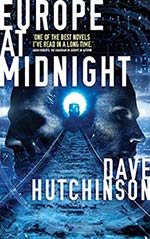
![]() couchtomoon
couchtomoon
1/27/2016
![]()
The Medical Faculty had been the last to fall. The Faculty Members had fought down to the last man (loc. 327).
Europe had been like a huge asylum, a deafeningly noisy and busy place. The Community seemed to be in a dream, drifting along in slow gentility (loc. 5583).
'It's the end of borders,' he told us. 'A quite simple trick of topology. It's not magic.' (loc. 4402).
I may have been the only one who, just over a year ago, clapped the cover shut on Dave Hutchinson's underdog hit, Europe in Autumn, with no expectation of a sequel. Or rather, I had hoped there would not be a sequel, despite the enticing twist ending. For a few reasons:
So, naturally, I avoided the internet for a few days after completion, convinced in my delusion that a fabulous and politically-resonant novel like Europe in Autumn would be left untouched, to ripple across genre as a standalone.
Sometimes, it's good to be wrong.
With the second release of his Fractured Europe series (which is itself fracturing as its cult success breeds promises of another book, then another book, then maybe another book...) it might seem as though somebody is milking the fractured cow, but Fractured Europe is a series in the sense that Bas Lag is a series, with Europe in Autumnand Europe at Midnight being very different novels about disconnected places. While Autumn gave us a larger picture of the continent, with Rudy sneaking across borders on various coureur errands, we learn by the cliffhanger ending that what we saw wasn't the complete picture. In the "sequel," Europe at Midnight, Hutchinson slows the shutter speed just enough to afford us a glimpse of where this might be going. As a series, these two novels are less a linear story, more a microscopic dissection of his favorite speculative hot spots. Perhaps we'll never get a panoramic view of his extrapolative world, but these novels seem to be headed toward at least a photographic collage of this border-loving landscape. Hutchinson sees the imminent through his journalistic eyes, and we're flipping through the pages of hisFractional Geographic.
...the problem with people like us is that we only ever see parts of the story... Or we see it from odd angles and perspectives. We very rarely see the whole picture (loc. 6473).
So, it's a not-a-series, and Midnight is a not-the-same-book. The (mostly) first-person lens leaves less room for Hutchinson's own under-the-breath narrative cynicism, and absent are the picaresque antics of Rudy and his family and accomplices, but Hutchinson's delightfully dry humor is present in other ways. In Midnight, the pseudonym'd protagonist and friends tend to play it straight, but "Rupert's" Boardroom savvy and Real World innocence are positively entertaining. And anyone who has ever worked within the political vestibules of Academia will find the setting of Midnight more than a little satirical.
As for the SF crowd that may be holding back, it is quite sci-fi: invisible staircases, gene-mod torture, porkchop guns, European sewage systems, dangerous maps, shifting landscapes, and orphan universes infiltrate the spy-thriller plot.
What Hutchinson fans might miss is the thick atmosphere and evocative prose of Autumn -- those metaphors of sunburn peels and Burger Kings have been exchanged for a frank accessibility that new readers should find welcoming or, rather, ensnaring. WhereAutumn dances around the mystery, Midnight is the mystery--almost to the point where I consider Midnight to be the more important of the two books. I almost dare to recommend this second installment first, especially to readers not already attracted by geopolitical commentary or jaded male protagonists. Midnight just might hook the readers that Autumn didn't attract.
Which is a good thing, because the undercurrent of commentary radiating from the two novels is as smart and stimulating as it is indispensable, establishing the Fractured Europe series as the most relevant SF project to hit the bookshelves this political era. I can't wait for more.
http://couchtomoon.wordpress.com